June 17, 2025 | 17:08 GMT +7
June 17, 2025 | 17:08 GMT +7
Hotline: 0913.378.918
June 17, 2025 | 17:08 GMT +7
Hotline: 0913.378.918
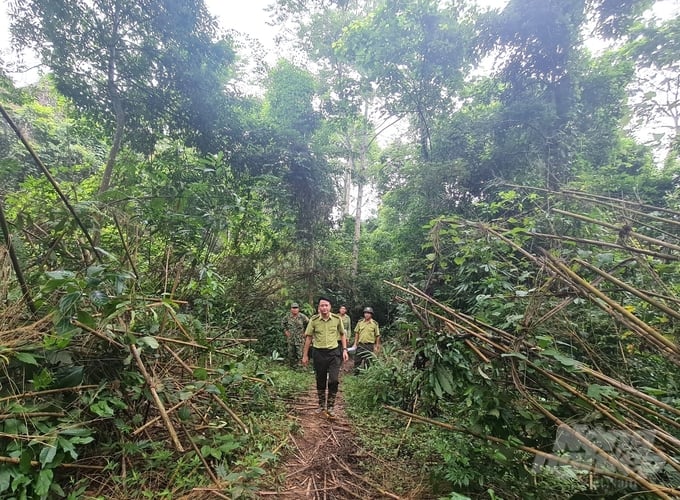
Tan Trao Special Use Forest Management Board is managing and protecting about 4,000 hectares of forest. Photo: Dao Thanh.
Mr. Nguyen Manh Thuong is the most active member of the households in Tuyen Quang province engaged in preserving and protecting the ATK Tan Trao special-use forest.
"I was born in 1986, the year of the monkey in the Chinese zodiac," said Thuong. The monkey must live and be attached to the forest. In the past, we used to destroy the forest, so today I voluntarily use my hands and attempt to restore it. Looking at the evergreen forest, I feel as though I were reborn.
In the past, in exchange for food and clothing, many residents of Tan Trao participated in deforestation to earn a livelihood. The entire ancient forest was taken down before the young trees had a chance to develop. Thuong recalled, that in the early 90s, when he witnessed three loggers in Thai Nguyen arriving here to clear the forest, who were apprehended later by the authorities. However, they were too aggressive in their opposition to the seizure. They were armed with blades, guns, etc. No one was willing to submit to them. He suddenly attacked from behind, causing the leader to collapse to the ground; the two men were then swiftly captured by the functional forces.
After that, he reflected on many aspects of his existence, including his time as a timber trader. Then it becomes apparent that doing good deeds is not at all challenging. Thoughts of deforestation and timber trade gradually vanished from his consciousness, much like the autumn wind that carried away the dropping leaves on the branches to make space for the young, spread shoots in the trunk.
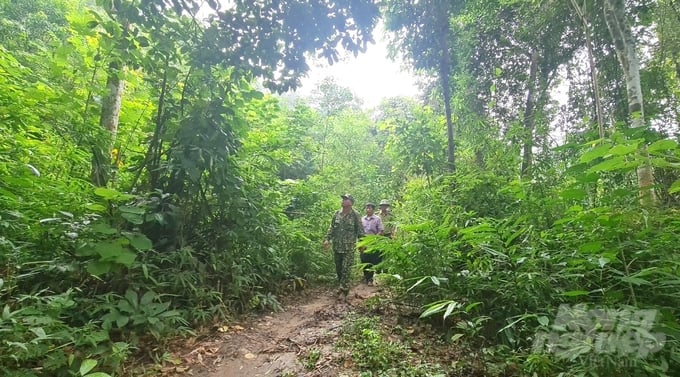
Mr. Nguyen Manh Thuong (leading) is always a pioneer in protecting the Tan Trao ATK special-use forest. Photo: Dao Thanh.
In 2001-2002, when the state introduced Project 661 in accordance with the 5 million ha forest program, Mr. Thuong was the first pioneer in the commune to implement afforestation practices. According to him, this was the second opportunity in his life to receive money from a forest, so he had to grab it. This time, the amount of money was less than before, but it was lawful and paid by the state. He also viewed it as an opportunity to repay the forest debt.
Following 10 years and then 20 years, the young forest trees mature and become more verdant. Some tree trunks are as large as a human's embrace.
Mr. Thuong's family continued to protect 30 hectares of forest in early 2020 when Tuyen Quang province had a policy of allocating contracts to households to partake in forest protection. Since he began protecting the forest, the loggers who learned about his forest have served as his eyes and ears to keep a watch on the forest, given his reputation for eliminating all three loggers that year by himself.
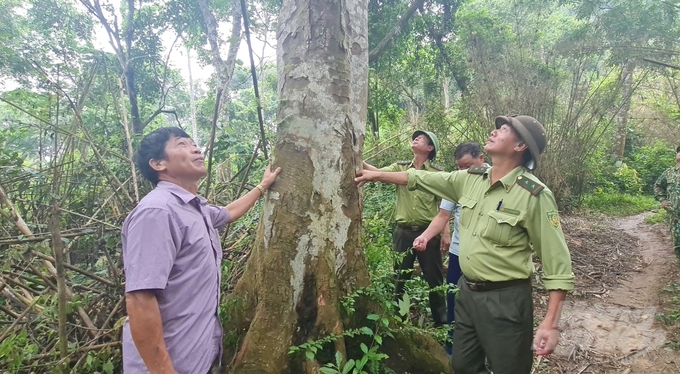
An ancient forest tree in ATK Tan Trao special-use forest. Photo: Dao Thanh.
Mr. Hoang Van Ho, head of Mo Che village in Tan Trao commune, disclosed that more than 60 Nung households reside in the forest area of Mo Che. To safeguard the forest, rangers advise local authorities in each village to establish a forest protection organization, but there is no funding. People like Mr. Ho are passionate participants.
To protect the forest, he mobilized police officers, farmer's associations, and youth organizations once a week to tote grass-cutting knives, rice balls, and water bottles as they explored the forest paths. Then, he and forest rangers from the ATK Tan Trao special-use forest went door-to-door in an effort to enlist residents in the protection of the forest.
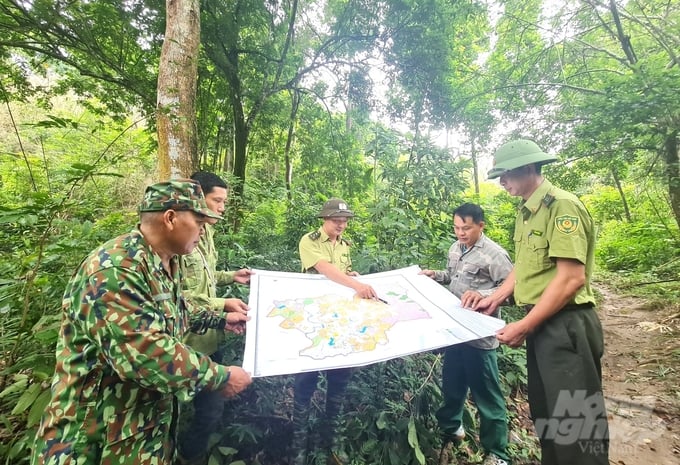
To protect special-use forests, locals' role is important. Photo: Dao Thanh.
Mr. Ho revealed that the villagers of Mo Che village in the conflict zone's highlands and forests who participated in deforestation are now elderly. He was previously implicated in deforestation. However, the same patriarch participated in afforestation and forest protection nearly twenty years ago. The juvenile forest trees he planted in the past are now tens to hundreds of years old and cover the special-use forests with a lush, verdant canopy. In 2020, eight households in the village of Mo Che will participate in forest protection and management in accordance with the contracted government policy. On average, each household receives about 18 to 30 hectares of special-use forest.
Now, the lives of the Nung people in Mo Che and villages are vastly improved. Numerous individuals are able to ponder for many generations to come. They have learned to believe that destroying the forest in the past was equivalent to damaging their own "nest"; therefore, it is now their responsibility to rebuild. Replanting a forest differs from constructing a home. It takes a couple of years, but it can take a lifetime for a forest tree to become sufficiently verdant, with a canopy that is cool enough to cover people and roots that are powerful enough to absorb enough water to help maintain the land for mountains and hills. In light of this, the forest in Mo Che is now filled with paths.
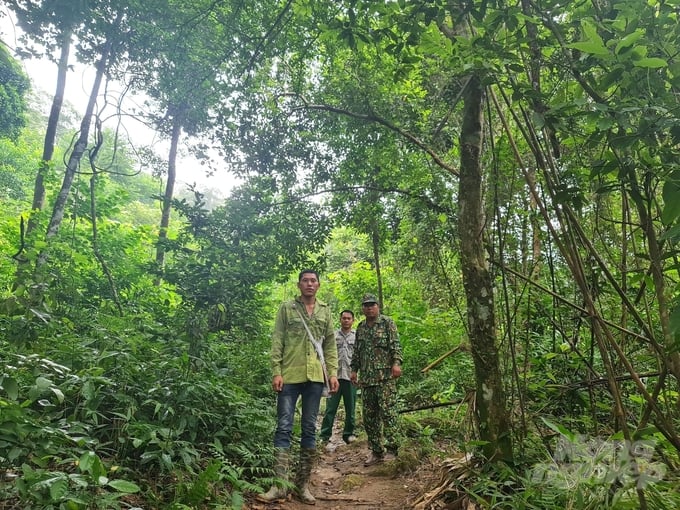
The people of Tan Trao commune participate in patrolling and protecting the forest. Photo: Dao Thanh.
Mr. Nguyen Cong Phuong, Deputy Head of the Son Duong Forest Ranger, has been a forest warden for nearly 20 years, the same amount of time he has been assigned to the Tan Trao special-use forest and the Son Duong forests. In the past 10 years, deforestation in the Tan Trao special-use forest has almost stopped occurring, particularly since the cassava growing activity on upland hills has ceased.
People abandon cassava cultivation to work in high-paying industrial zones within and beyond the province. Many individuals are able to generate a stable income by opening tourism services based on historical relics and gorgeous forests in conflict zones.
Mr. Nguyen Cong Phuong stated that if you want to protect the forest effectively, you must know how to promulgate and campaign so that people can hear and comprehend that the forests immediately adjacent to the village once protected Uncle Ho and the revolution. The current generation must know how to repay their ancestors' and the nation's debts. However, the best method to redeem the debt is to preserve and protect the forest so that it continues to grow in wealth.
Translated by Linh Linh
![Turning wind and rain into action: [5] Hue applies modern technology in disaster forecasting](https://t.ex-cdn.com/nongnghiepmoitruong.vn/608w/files/news/2025/06/17/z6704423696987_15fd32ffc26d590d204d520c9dac6786-nongnghiep-093938.jpg)
(VAN) In Hue city, modern technology has recently been applied in meteorological and hydrological forecasting and warning, helping to reduce the damage caused by natural disasters.

(VAN) A cutting-edge farming technique being implemented on an experimental ranch in Arizona's Sonoran Desert has already saved a billion gallons of water over five years, according to Civil Eats.

(VAN) Poultry and pig production and the environment can be boosted through enhanced water technology, according to new research.
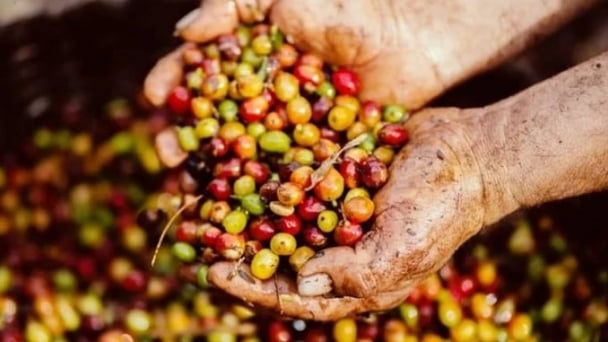
(VAN) Coffee prices on June 16, 2025 are unchanged. In Vietnam, local trading prices are holding steady, ranging around VND 112,000 – VND 112,500/kg.
![Turning wind and rain into action: [4] Bringing climate bulletins to remote and isolated areas](https://t.ex-cdn.com/nongnghiepmoitruong.vn/608w/files/linhnhp/2025/06/14/1152-z6704423696987_15fd32ffc26d590d204d520c9dac6786-nongnghiep-151141.jpg)
(VAN) The Vietnam Agriculture and Nature Newspaper interviewed Mr. Vu Thai Truong, Acting Head of Climate Change and Environment at UNDP Vietnam, to gain deeper insight into how climate bulletins are delivered to farmers.

(VAN) In Tien Giang, a high-tech shrimp farm has developed a distinctive energy-saving farming model that has yielded promising results.
![Turning wind and rain into action: [3] 300.000 farmers benefit from agro-climatic bulletins](https://t.ex-cdn.com/nongnghiepmoitruong.vn/608w/files/news/2025/06/12/e5a48259d6a262fc3bb3-nongnghiep-125122.jpg)
(VAN) The agro-climatic bulletin has become a valuable tool for farmers in the Mekong Delta. After more than five years of implementation, the initiative is gradually being expanded nationwide.